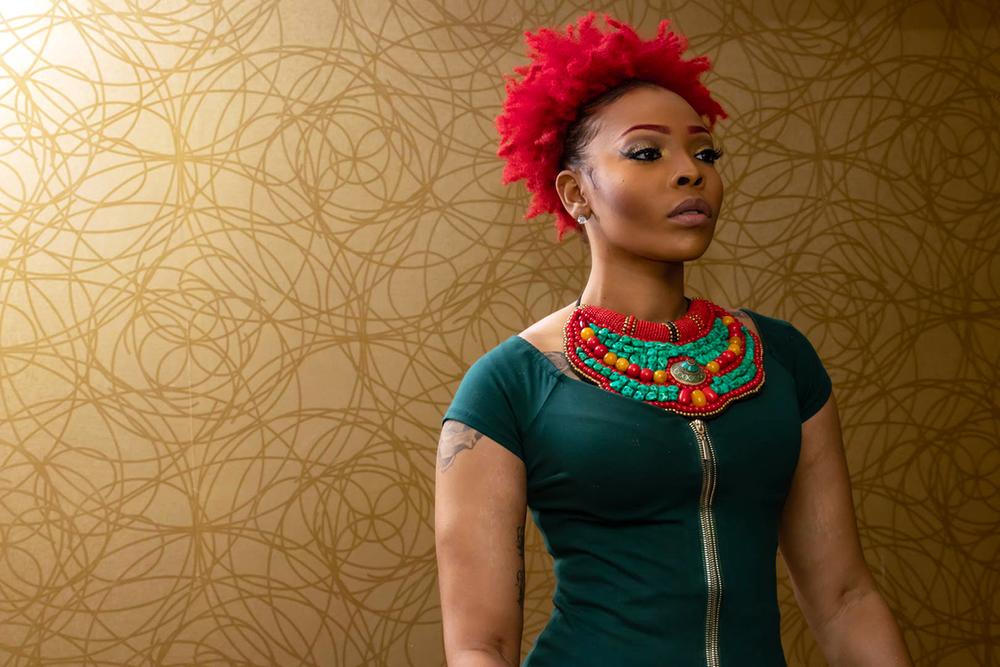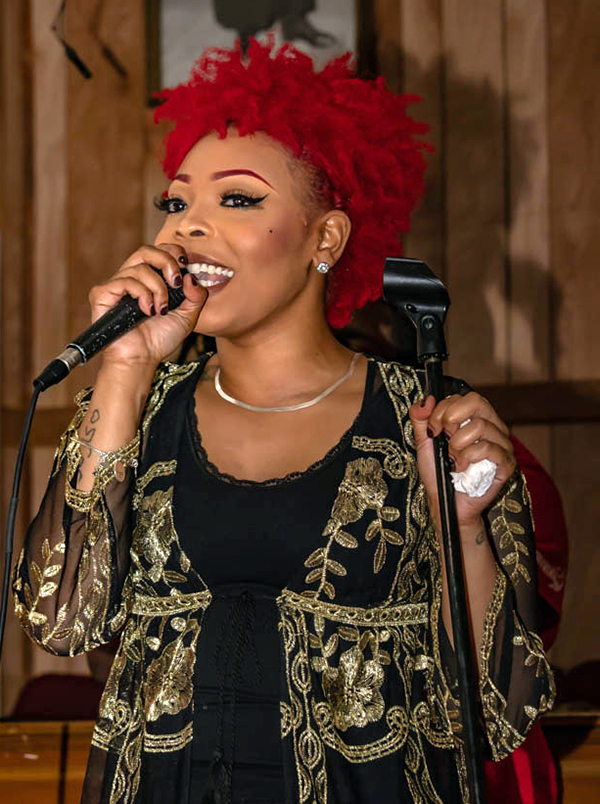
Her birthday is the day before the Fourth of July, which is appropriate because gospel sensation Alexis Spight, on the cusp of 26, is incandescent, a joyful explosion of light, energy, and sound.
Talking with the singer-songwriter by phone for the first time feels like a late-night conversation with your best friend. Physical distance—in this case 800 miles between her current base in Houston and Kansas City, Kan., where she spent her formative years and where her father is still a preacher at a historic inner-city church—is erased. When Alexis is on your phone, she’s in the room. Her silky voice slides over you like spring water on a pebble, and you just want to go on listening.
At age 19, Spight made it to the finals of BET’s TV singing competition, Sunday Best, coming up just short of the crown. She was instantly signed to a record deal with Music World Gospel. Her first album L.O.L. (Living Out Loud), hit Number One on the Billboard Gospel charts before her 20th birthday. Her sophomore album, Dear Diary, debuted at Number Two. Last year she released a third album, All is Not Lost.
The singer-songwriter has won three Stellar Gospel Music Awards, performed at the NAACP Image Awards and toured around the country as well as in The United Kingdom, Canada, and the Bahamas.
Despite her current digs in Houston, Spight feels deep connections to Kansas City. She bubbles with love and praise for her dad’s church, the Madden Temple Church of God in Christ in Kansas City, Kan. And also the Plaza, especially Brio Tuscan Grille; the Power & Light District; Gates barbecue; the Blues and Jazz Juke House on E. 18th Street and “all the fish spots, all of them.”
Is there anything you found yourself missing after you moved away that surprised you?
I miss the storms in Kansas City. The rain is just breathtaking. You can see it come down on the whole landscape because there’s not a bunch of mountains or tall buildings in your way. And I’m a music head—I hear music in rain. In Kansas City, the combination of the fountains everywhere and the rain during storms gave me so much inspiration. I love it there. And I do miss it.
You had to cancel our first phone call to take shelter during a tornado warning in Houston. So the storms you love seem to have followed you, but your career has been all smooth sailing so far.
The Lord has been so faithful. When I travel around the country, I see so much talent and skill, so I know it’s just God’s grace and favor. But I’m excited about the journey. It’s been dope.
You were a teenager when you signed your first record deal. How prepared were you for the music industry and the role of professional singer?
Oh my God, I was so unprepared! I was 18-years-old, straight out of high school, trying to figure out how to do my taxes, how to be an adult. So the gospel music industry was a total whirlwind. It was life doubling. That just became my college.
For the finale of Sunday Best, you took a beloved gospel hymn, The Power in the Blood, and completely blew it up and put it back together as a hip-hop anthem. Were you nervous about whether the judges and the audience would accept such a radical re-interpretation of a classic?
I understood the risk. I’m a church girl, my daddy’s a preacher and I’m fifth generation of Church of God in Christ, but I’m from the hood, man! I grew up in the projects (laughs.) That culture fills my veins and it fuels my music.
So when I got the opportunity to be on Sunday Best and be seen in 50 million homes, I thought, “Either they like me or they don’t like me, but I’m going to be myself.”
You blogged about reaching the age of 20 without having a baby. You wrote that your mother, your grandmother and your great grandmother all had a baby by age 20. What were the costs you saw to those women in your family that made you decide to not let that happen to you?
First, I’ve got to say that I’ve learned there is so much strength that comes from being put in difficult positions. The second thing I learned is, life is inevitable. Sometimes things happen that you didn’t choose and you have to decide if those things are going to punish you or propel you. That said, being able to look at those women I love from a seat of observation, I was able to see it was a cycle in my family, and one I strongly desired to break. Knowing the consequences of what your flesh desires can compel you to make a better choice for your future.
“I am very optimistic, because I am a woman of faith. We need to put all of our faiths together, because we are better together.”
You hosted an online forum called “God Sisters” where young women could ask you in live time questions about real life: peer pressure, bullying, sex, drugs. Why did you want to do that?
A lot of young women need a mentor, a big sister, someone that can show them a better way. I’m the oldest of five kids—I have three younger sisters and a brother. So being a big sister has provoked the inner lioness in me, to want to lead and protect.
I’m also transparent: I’ve snuck out of the house, I’ve made bad choices. I got arrested and locked up once because I put myself in the wrong place at the wrong time. I think in music and in all aspects of life, people want realness and I want to give them the real.
I have a passion for the homeless because I was homeless. I have a passion for young ladies because I am a young lady. Because I was the oldest, I didn’t have a big sister I could go to. Now I physically go to where girls are. I’ll meet them at school, and I’ll talk to their teachers and see how they’re doing.
You’ve blogged about the difference between “church people” and “Kingdom folk.” What is the distinction?
There are too many people who are not focused on 1 Samuel 16 where it says “Do not look at his appearance or height, for I have rejected him; the Lord does not see as man does. For man sees the outward appearance, but the Lord sees the heart.”
So many people are distracted by people’s exterior, but we need to focus on people’s hearts. There are so many people who want to come to church but they don’t see enough people who look like them. I struggled in my uniqueness. I would ask God, “Why did you make me so different?” and He was like, “I made you like this to show other people who are just like you that they don’t have to fit into a traditionalist mentality. They don’t have to look a certain way to be saved.”
I’m here to show that there is a place for everyone in the Kingdom. That’s what Kingdom is all about. I believe when we get to the Kingdom, we will see different faces, we will hear different languages, and that’s what makes us beautiful.

You’ve written that you like to “provoke change.” You use your Facebook and Twitter platforms to call out racism and police brutality and injustice. Do you ever weigh whether wading into political topics helps you or hurts you career-wise?
I do think about that. Sometimes I think, “Hmm, I wonder how people will feel when they read this?” And then the thought passes in about five seconds.
I feel compelled. It goes back to when I was five. One day in kindergarten, kids in my class dared me to moon the class when the teacher left the room, so I did—I was that kid. When the teacher came back in that class, because my father had always taught me (laughs) “the truth will set you free,” I was honest enough to tell my teacher what I had done, and I didn’t throw my friends under the bus.
When I got home and explained to my parents why I did it, and my father was so disappointed, not because of what I did, but why I did it. He told me, “You are a leader. You are a Spight. How dare you listen to those kids and allow them to influence you to do something you would not do?”
From that moment, I have been very aware of my role and lineage as a leader, a revolutionary, a pioneer of change, always secure in and true to my values. I don’t need everybody to like me. I feel like it’s part of my calling to be that voice for the underdog, for the weak, for the person that is told to shut up and cries silently. And I will deal with the consequences of that.
Are you optimistic or pessimistic, when you look out at the current cultural and political landscape?
I am very optimistic, because I am a woman of faith. We need to put all of our faiths together, because we are better together. I’m working on a book now called, The Weight is Over and I’m going to release it at a conference next year called The Weight is Over 2020 where I’m going to bring people together around the idea of releasing everything that is blocking us, so that we can see more clearly than we’ve ever seen before. We’ll have workshops about getting financially fit, physically fit, emotionally and relationally fit, spiritually fit. I’ve got known people coming, a former WNBA player, an athlete training for the Olympics, some great preachers, a relationship expert, and of course friends in music—there will be a lot of music. So stay tuned for that.
Are you a goal-setter? Do you have goals for what you want to achieve by the time you are 30 or some other point in time?
Yes, I absolutely do. I want to use my foundation to give back, especially to people in the inner city. I want to teach kids how to do their taxes, how to develop a trade, how to grow their own vegetables—things that I was not taught how to do. Things that kids in affluent communities are given access to that kids in the inner city, and especially children of color, lack access to because of the lack of resources.
I also want to be a wife. I want to build with someone. But I’m not in a rush. I feel that my last relationship catapulted me to a level where I am very, very ready. I am also open to waiting if the Lord wants, but it is a desire, so lift me up about that.
Interview condensed and minimally edited for clarity.


